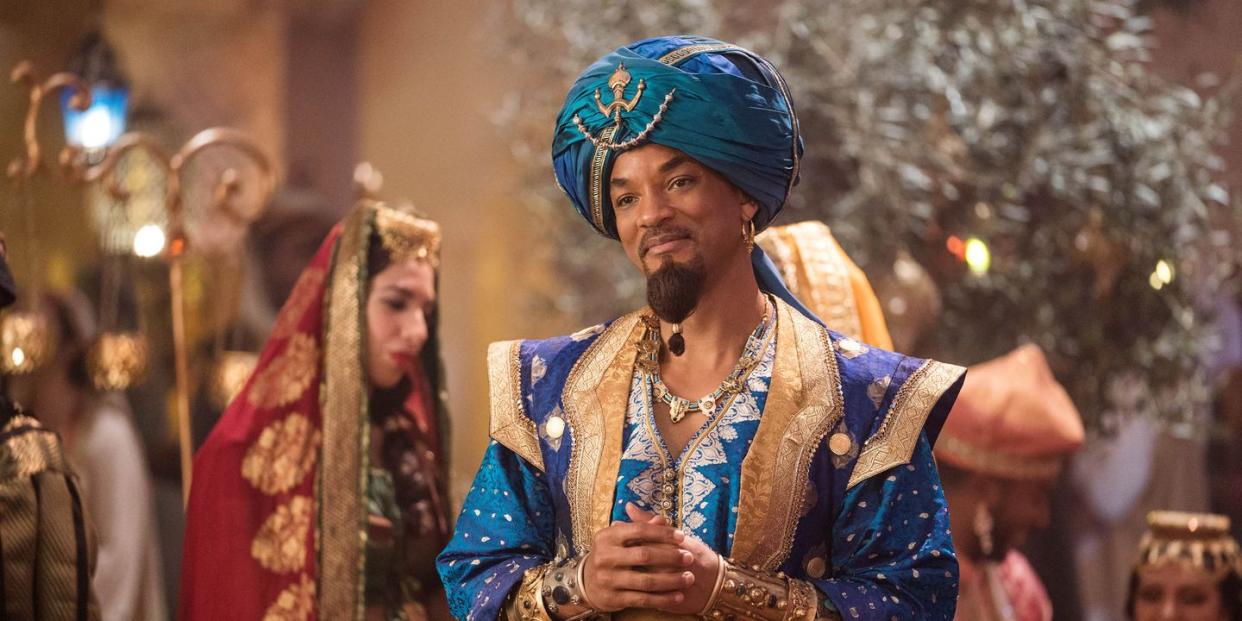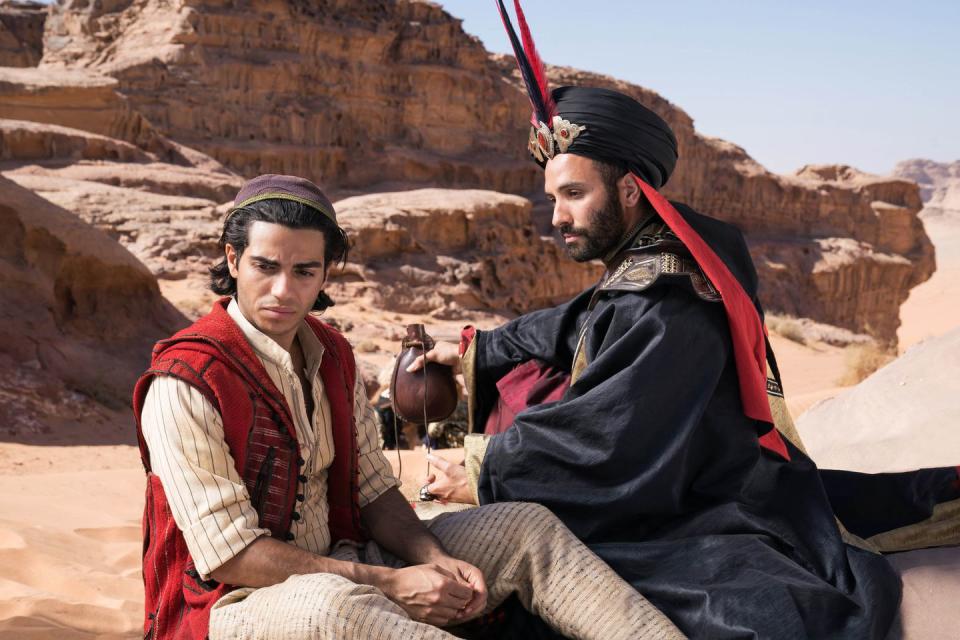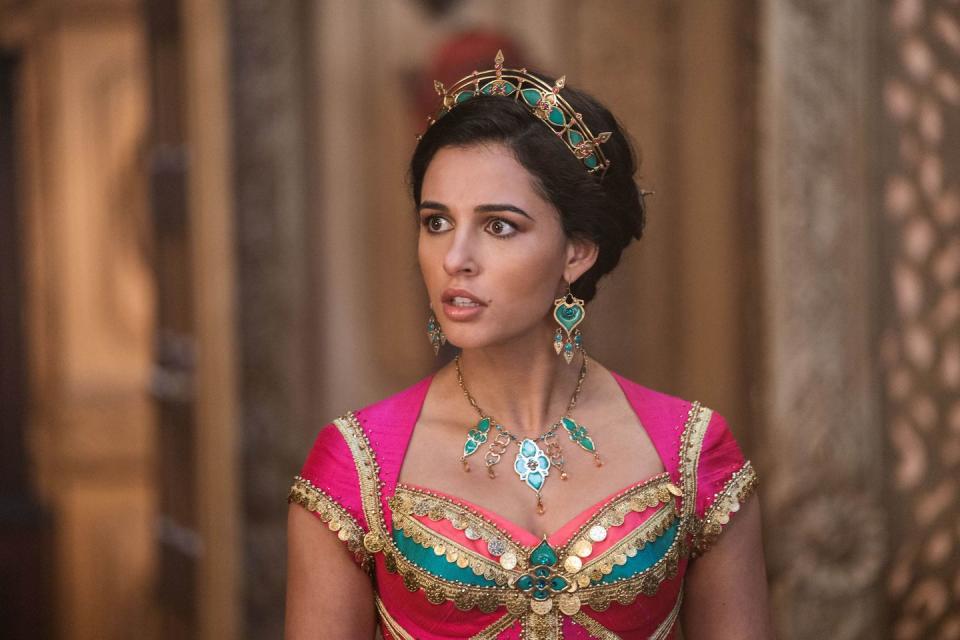Guy Ritchie's 'Aladdin' Is Unfortunately Not a Cocaine-Addled Crime Thriller

Guy Ritchie, he of the fast-talking cockney crime films, would seem an inspired (if, on the surface, unconventional) choice to helm Disney’s live-action remake of Aladdin, its beloved 1992 animated fable based on One Thousand and One Nights’ Aladdin and the Magic Lamp. Whether in his breakthrough Lock, Stock and Two Smoking Barrels or his subsequent Snatch and RocknRolla, Ritchie has exhibited a fondness for projects about wisecracking thieves and crooks with big dreams. He’s the patron saint of underworld underdogs who stick it to arrogant power-mad tyrants, stitching his sagas together with plenty of defiant attitude, rapid-fire montages (often flip-flopping back-and-forth through time, and narrated by characters), and whiplash cinematography.
From the (uneven) start, Ritchie’s brash style – part authentic British badassery, part second-rate Quentin Tarantino mimicry – was distinctive. And though he began in modest terrain, he’s increasingly gravitated toward the studio stage, all without sacrificing his idiosyncratic hallmarks. In the case of 2009’s Sherlock Holmes and 2015’s The Man From U.N.C.L.E., Ritchie’s adrenalized approach was well-suited for the outsized proceedings at hand, thanks in part to dashing mega-watt leading men (Robert Downey Jr. and Jude Law in the former; Henry Cavill and Armie Hammer in the latter). When it doesn’t work, however, it doesn’t work badly, as evidenced by 2017’s King Arthur: The Legend of the Sword, a misshapen and clumsy attempt to give the legendary Knight of the Round Table a Lock, Stock-esque origin story on a monsters-and-magic blockbuster scale.
Given that career trajectory, Aladdin – a bright, colorful comedic adventure and romance about a “street rat” who becomes a prince – would seem, regardless of its setting, to be a natural fit for the 50-year-old director. Alas, he’s helpless to prevent this Disney re-do from being a whole new world of pointless dullness.

Ritchie’s touch is apparent in a select few sequences: a chase through the Agrabah marketplace that employs swinging camerawork and slow-motion; and the show-stopping “Friend Like Me” number, which is edited with the sort of cocaine-addled zippiness that’s long been his (exhausting) trademark. During those passages, Aladdin proves, like his significantly inferior King Arthur, an opportunity for the filmmaker to refashion a classic in his own idiosyncratic image.
With Ritchie handcuffed for the majority of the action, however, those moments turn out to be fleeting. And the only other source of unique personality to be found here – courtesy of Will Smith as the blue-skinned Genie – is wildly hit-or-miss. On the basis of its prior Cinderella, Beauty and the Beast and The Jungle Book do-overs, Disney has learned that sticking to a tried-and-true template is the surest means of box-office success (a fact also confirmed by Tim Burton’s more expansively reimagined, and modestly performing, Dumbo). Thus, Ritchie generally plays it safe, which certainly ensures that disaster is averted. It also renders his latest a functional pantomime of an animated predecessor that, in the long run, will remain the preferred choice by fans and casual moviegoers alike.
Which is to say, you’ve already had a friend like Aladdin, and he was far more charming the first time around.
Ritchie’s version is bookended by a sailor (Smith) recounting the story of Aladdin to his two kids. It’s a minor addition that adds little – something that can be said about most of the alterations made to Ron Clements and John Musker’s original. In the streets of Agrabah, Aladdin (Mena Massoud) and his trusty monkey Abu steal from the rich and give to the poor, as well as keep enough to feed themselves. His life is upended by a chance encounter with Princess Jasmine (Naomi Scott), out enjoying the marketplace in disguise because her protective sultan father (Navid Negahban) keeps her locked away in the palace. A flight from authorities solidifies their bond, as does deception, since Aladdin believes Jasmine to be the princess’ handmaid. That’s not the only complication to befall them, as no sooner have they begun to swoon for each other than Aladdin is compelled by the Sultan’s evil vizier Jafar (Marwan Kenzari) to enter the Cave of Wonders to procure a mystical lamp.
If you’ve seen 1992’s Aladdin, you know what follows: magic carpet rides across the glistening nighttime city; squawking by Jafar’s parrot sidekick Iago (Alan Tudyk); and the motormouthed bluster of the Genie. Smith’s wish-granting servant can appear a bit clunky when in smoky CGI’d form, but by and large he strikes a fittingly over-the-top supernatural pose. His smartass routine is similarly cartoonish, and occasionally lends the material some verve. It can also be gratingly groan-worthy, especially when Smith leans too hard into making the Genie an approximation of his own persona. Watching him beatbox or brush off his shoulder during a song-and-dance performance, or speak in contemporary slang, is to be reminded that Smith is funniest when he stays on script.
And that’s not even taking into account the confounding strangeness of watching his Genie woo Jasmine’s handmaid Dalia (Nasim Pedrad), which brings up a host of human-magical creature coupling questions that the film can’t logically shoulder.
Inevitably, the spirit of Robin Williams hangs over these proceedings. While that’s no fault of Smith’s, it winds up being a peskier-than-imagined problem. The Genie was, in a certain sense, the ideal role for Williams, setting him free from the constraints of time and space (and sanity) and allowing him to indulge in his every verbally dexterous whim (the Ed Sullivan impersonation, in a kid’s film, still stands as a WTF all-timer). Computers let Smith materialize in triplicate, zoom around the frame, pump iron with outsized muscles, and conjure up crazy costumes and entourages for Aladdin. Yet those effects, like Smith’s game turn, come across as strained and relatively small, further underlining the limitations of trying to channel, aesthetically and tonally, the spirit of an animated fairy tale that was wholly divorced from reality.

Smith can’t carry much of a tune, so he frequently opts for a sing-songy spoken-word approach. In that respect, he’s no more out of his element than Ritchie, whose direction veers from dynamic to static and awkward with frustrating regularity. His camera often assumes the blandest position imaginable for musical or conversational scenes set amidst opulent production design. Then again, taking a straightforward approach is this Aladdin’s guiding principle, including with regards to its leads. Both Massoud and Scott are just cheerful and charismatic enough to avoid resembling animatronic Disneyland figures, but they pale in comparison to the memory of their hand-drawn ancestors. That holds for just about everyone involved in this endeavor, including Tudyk as a milder-than-Gilbert-Gottfried version of Iago, and Kenzari, whose campy performance as Jafar comes replete with an instance of him furiously twirling about in the desert while screaming “Nooooo!’ to the heavens.
Of the few new songs that accompany Alan Menken’s catchy originals, it’s Jasmine’s “Speechless” (penned by Menken, Benj Pasek, and Justin Paul) that serves the greatest function, casting her (as did Kenneth Branagh’s Cinderella with its own icon) as an empowered feminist. Nonetheless, it makes little difference in the final tally, as Aladdin eschews rocking the boat too hard lest it confuse and alienate its target demographic. Despite hiring a director with his own easily identifiable signature, Disney’s dictate to keep things familiar and simple rules the day. The result is a Ritchie film that’s frequently passable without being particularly engaging – a cover song with a bit more orchestration and gaudiness, perhaps, but quite a bit less purpose and heart.
('You Might Also Like',)

